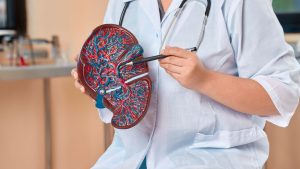
Fatty liver disease and gallstones are two frequent gastrointestinal and liver disease conditions that are frequently mutually entangled by overlapping risk factors and pathophysiologic mechanisms. Their effects on the digestive system and liver are most significant to realise for proper management and prevention of ensuing complications. This article discusses the impact of gallstones and fatty liver disease on the liver’s function, as well as on digestion. Additionally, it examines some therapeutic agents and medicines that help maintain the liver and gallbladder in good health.
What is Fatty Liver Disease and How Does It Affect Digestion?
Fatty liver disease, also known as hepatic steatosis, is characterised by the abnormal accumulation of fat in liver cells. Minimal fat in the liver is normal, but excess fat accumulation damages the liver function, including fat metabolism, bile secretion, and detoxification. Fatty liver has been classified into alcoholic fatty liver disease (based on chronic alcohol intake) and non-alcoholic fatty liver disease (NAFLD), which is associated with obesity, diabetes, and metabolic syndrome.
The liver is essential for digestion, as it produces bile, a substance that emulsifies fats and makes them usable by the body in the intestines. Fatty liver, when it occurs, destroys and inflames liver cells, making bile production less effective. As a result, digestion and absorption of dietary fats are affected, which can cause digestive distress, nutrient insufficiency, and malabsorption syndromes.
Fatty liver disease can develop silently, often without symptoms in the early stages. After the disease has progressed to non-alcoholic steatohepatitis (NASH), fibrosis, or cirrhosis, liver function continues to worsen, resulting in effects in the body as a whole due to toxin accumulation and metabolic imbalance.
Understanding Gallstones and How They Affect Digestion
Gallstones are hardened accumulations, most often cholesterol or bilirubin, that develop within the gallbladder, a small, bile-storage organ secreted by the liver. Gallstones range from minute grains to large stones that block the flow of bile.
Physiologically, gallstones impede the discharge of bile into the small intestine, thereby hindering the digestion of fat. Clogging of bile ducts leads to the ineffective emulsification of fat, resulting in bloating, indigestion, fatty stools, and malabsorption of nutrients.
Gallstones can be silent or lead to periodic pain called biliary colic. Once a gallstone blocks bile flow for an extended period, it can cause inflammation (cholecystitis), infection, or jaundice due to bile backflow into the liver. To support overall liver and digestive health, some people incorporate beet root capsules into their routine, as they are rich in nutrients that may aid bile flow and reduce oxidative stress. Get your high-quality supplements from https://www.amazon.com/
Another way to improve digestive health is to explore natural cleansing methods such as using IverPure Parasite Cleanse. This approach is often viewed as a supportive measure that may help promote better gut balance and overall well-being when combined with a healthy diet and medical guidance.
How Fatty Liver and Gallstones Interrelate
Fatty liver and gallstones have shared risk factors like obesity, diabetes, insulin resistance, metabolic syndrome, and diets rich in fat. Impaired bile secretion in fatty liver worsens bile composition and flow, making the organ more prone to gallstones. Obstruction of bile ducts by gallstones, in contrast, aggravates damage to the liver and promotes liver fibrosis. Medicines like udiliv 300 tablet are sometimes prescribed to support bile flow and improve liver health.
This interrelatedness underscores the necessity for intervention on lifestyle issues, metabolic health, and early medical care of patients with either condition.
Role of Medications: Udiliv 300 and Ursolid 300 Tablet
Medicines like Udiliv 300 and Ursolid 300 Tablet offer therapeutic benefits when treating these conditions. Both include ursodeoxycholic acid (UDCA), a naturally occurring bile acid in the body. It increases bile secretion, lowers cholesterol saturation, and guards against the liver.
Udiliv 300 is generally prescribed to enhance the liver’s functions, minimise the levels of liver enzymes in fatty liver disease, and facilitate the healing of liver inflammation.
Ursolid 300 Tablet is generally prescribed to dissolve cholesterol gallstones and avoid the formation of new stones by normalising bile composition.
UDCA also inhibits bile acid toxicity in liver cells and suppresses inflammation, increasing metabolic control and digestion. These medications are safe and effective dietary adjuncts when taken under a physician’s supervision.
Management of Fatty Liver and Gallstones with Lifestyle Interventions
Other than medicines, lifestyle interventions are critical:
- Diet: A low-fat and high-fibre diet, focusing on fruits, vegetables, whole grains, and lean meats, promotes gallbladder and liver health. Limit added sugars, saturated fats, and highly processed foods. Healthy fats are provided by nuts, seeds, and fish oils to support metabolic function.
- Weight Management: Gradual weight loss helps decrease liver fat storage and reduces the risk of gallstones.
- Physical Activity: Regular physical activity enhances insulin sensitivity, supports liver metabolism, and promotes healthy bile flow.
- Avoid Alcohol: Alcohol worsens liver damage in fatty liver disease.
When to Seek Medical Evaluation
Early evaluation is needed if you have symptoms like chronic upper abdominal pain, jaundice, vomiting and nausea, or nonspecific weakness. Imaging studies, such as ultrasound or CT scans, help identify gallstones and changes in fatty liver. Laboratory tests examine liver enzymes and function.
Accurate diagnosis enables personalised treatment regimens that may include medications such as Udiliv 300 or Ursolid 300 Tablet, dietary recommendations, and, in some instances, even surgeries, such as gallbladder removal in the event of complications.
Conclusion
Fatty liver disease and gallstones have a profound impact on digestion and liver function, primarily through impaired bile production and flow, altered fat absorption, and inflammation. Their interrelated nature underscores the need for treatment with a holistic approach that targets metabolic risks and gastrointestinal function. Medicines like Udiliv 300 and Ursolid 300 Tablet support diet and lifestyle modifications by enhancing bile dynamics and maintaining liver cell function.
Early detection and proper treatment will stop degeneration to liver damage, reduce gastrointestinal discomfort, and improve overall quality of life in affected individuals with these disorders.
